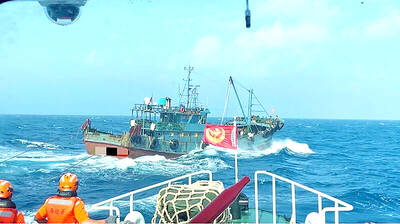The government is considering removing an optional path to citizenship for residents from Hong Kong and Macau, and lengthening the terms for permanent residence eligibility, a source said yesterday.
In a bid to prevent the Chinese Communist Party (CCP) from infiltrating Taiwan through immigration from Hong Kong and Macau, the government could amend immigration laws for residents of the territories who currently receive preferential treatment, an official familiar with the matter speaking on condition of anonymity said.
The move was part of “national security-related legislative reform,” they added.

Photo: AFP
Under the amendments, arrivals from the Chinese territories would have to reside in Taiwan for four years before becoming eligible for permanent residency, up from the current one year, and they would no longer be able to apply for citizenship after obtaining permanent residency, the official said.
The proposal was being considered in response to the changing situation in Hong Kong, to which more than 2 million mainland Chinese have migrated since the 1997 handover of the territory, the source said.
Taiwan’s relaxed immigration policies for Hong Kongers has become a major national security loophole, especially after Beijing imposed the territory’s National Security Law in 2020, which significantly altered Hong Kong’s landscape and enhanced the authorities’ power, they said.
“Whether they arrived through marriage with a Taiwanese, investment immigration or obtained residency through a professional skill, Hong Kong migrants almost always apply for permanent residence in the second year,” they said.
“No country in the world has an immigration policy like Taiwan, with such relaxed terms,” they added.
Under the proposed amendments, residency applicants from Hong Kong or Macau who have worked for the CCP, the Chinese military or Chinese public institutions would be strictly scrutinized and potentially have their applications denied, the official said.
“The original purpose behind allowing Hong Kong and Macau residents to easily apply for permanent residency in Taiwan is no longer applicable given the changes to those territories caused by CCP policies,” they said.
The proposal would bring rules for Hong Kong and Macau residents in line with those of immigrants from other countries, and would still be more lenient than the rules for applicants applying from China, they said, adding that Chinese must stay in Taiwan for six years before they may apply for a national ID card.
The option of “long-term residence” for applicants from the two territories is similar to the permanent residency option available to other foreigners, with the key exception being that the “long-term residence” option does not allow a path to citizenship, the source said.
“We have found that some migrants from Hong Kong and Macau are not interested in Republic of China citizenship anyway, and only want some form of permanent residence. So, we do not anticipate the change being a problem,” they said.
Authorities would review the proposal, and would communicate with Hong Konger groups in Taiwan before amending the laws, they said.

The Republic of China (ROC) is celebrating its 114th Double Ten National Day today, featuring military parades and a variety of performances and speeches in front of the Presidential Office in Taipei. The Taiwan Taiko Association opened the celebrations with a 100-drummer performance, including young percussionists. As per tradition, an air force Mirage 2000 fighter jet flew over the Presidential Office as a part of the performance. The Honor Guards of the ROC and its marching band also heralded in a military parade. Students from Taichung's Shin Min High School then followed with a colorful performance using floral imagery to represent Taiwan's alternate name

COGNITIVE WARFARE: Chinese fishing boats transmitting fake identification signals are meant to test Taiwan’s responses to different kinds of perceived incursions, a report said Chinese vessels are transmitting fake signals in Taiwan’s waters as a form of cognitive warfare, testing Taipei’s responses to various types of incursions, a report by the Institute for the Study of War said on Friday. Several Chinese fishing vessels transmitted fake automatic identification system (AIS) signals in Taiwan’s waters last month, with one mimicking a Russian warship and another impersonating a Chinese law enforcement vessel, the report said. Citing data from Starboard Maritime Intelligence, the report said that throughout August and last month, the Chinese fishing boat Minshiyu 06718 (閩獅漁06718) sailed through the Taiwan Strait while intermittently transmitting its own AIS

CHINESE INFILTRATION: Medical logistics is a lifeline during wartime and the reported CCP links of a major logistics company present a national security threat, an expert said The government would bolster its security check system to prevent China from infiltrating the nation’s medical cold chain, a national security official said yesterday. The official, who wished to stay anonymous, made the remarks after the Chinese-language magazine Mirror Media (鏡周刊) reported that Pharma Logistics (嘉里醫藥物流) is in charge of the medical logistics of about half of the nation’s major hospitals, including National Taiwan University Hospital and Taipei Veterans General Hospital. The company’s parent, Kerry TJ Logistics Co (嘉里大榮物流), is associated with the National Committee of the Chinese People’s Political Consultative Conference (CPPCC) and the Chinese People’s Liberation Army (PLA), the

COVETED PRIZE: The US president would be a peace prize laureate should he persuade Xi Jinping to abandon military aggression against Taiwan, William Lai said US President Donald Trump should get the Nobel Peace Prize should he be able to convince Chinese President Xi Jinping (習近平) to abandon the use of force against Taiwan, President William Lai (賴清德) told a conservative US radio show and podcast in an interview. The US is Taiwan’s most important international backer, despite the absence of formal ties, but since Trump took office earlier this year he has not announced any new arms sales to the nation. Trump could meet Xi at the APEC summit in South Korea on Oct. 31 and Nov. 1. Lai, speaking on The Clay Travis and Buck Sexton